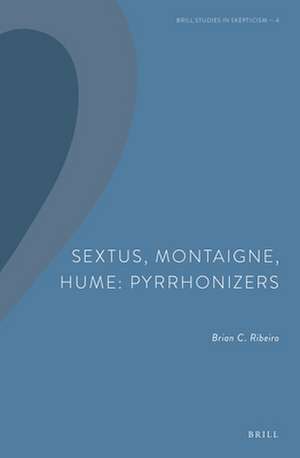Sextus, Montaigne, Hume: Pyrrhonizers: Brill Studies in Skepticism, cartea 4
Autor Brian C. Ribeiroen Limba Engleză Hardback – 28 iul 2021
Preț: 856.35 lei
Preț vechi: 1044.33 lei
-18% Nou
Puncte Express: 1285
Preț estimativ în valută:
163.88€ • 170.46$ • 135.29£
163.88€ • 170.46$ • 135.29£
Carte disponibilă
Livrare economică 25 martie-08 aprilie
Preluare comenzi: 021 569.72.76
Specificații
ISBN-13: 9789004465398
ISBN-10: 9004465391
Dimensiuni: 155 x 235 mm
Greutate: 0.39 kg
Editura: Brill
Colecția Brill
Seria Brill Studies in Skepticism
ISBN-10: 9004465391
Dimensiuni: 155 x 235 mm
Greutate: 0.39 kg
Editura: Brill
Colecția Brill
Seria Brill Studies in Skepticism
Notă biografică
Brian C. Ribeiro is U.C. Foundation & North Callahan Distinguished Professor of Philosophy at The University of Tennessee at Chattanooga, where he has taught since 2004. He specializes in the study of skepticism, ancient, early modern, and contemporary.
Cuprins
Acknowledgements
List of Abbreviations
Introduction
1 The Reality of Epistemic Akrasia
1 Epistemic Akrasia
2 What Would Epistemic Akrasia Involve?
3 Epistemic Akrasia Is Actual (and, Therefore, Possible)
4 Concluding Remarks (and Looking Forward)
2 Sextus, Montaigne, Hume: Exercises in Skeptical Cartography
1 Sextus Empiricus
2 Michel de Montaigne
3 David Hume
4 Concluding Remarks
3 Sextus Empiricus and Pyrrhonism as Aspirational
1 Is Pyrrhonism Psychologically Possible?
2 The Scope of Pyrrhonian Epochē
3 The Role of Pyrrhonian Epochē: Skepticism as a Eudaimonistic Ethic
4 Particularly Problematic Beliefs and Ataraxia
5 The Psychological Possibility of Pyrrhonism
6 Postscript
4 Montaigne’s Essays and/as Pyrrhonism
1 Approaching Montaigne’s Essays
2 The Presence of the Ancients in the Essays
3 Montaigne with Sextus and Cicero
4 Montaigne’s Skeptical Allegiance in the “Apology”
5 Is Montaigne Really a Pyrrhonist?
6 Montaigne’s Pyrrhonian Turn to Self-Examination
7 Montaigne’s Essays: Writing as Pyrrhonizing
5 Failing to be Responsive to Reasons: Unbudging Faith, Irresistible Beliefs
1 Hume on Montaigne’s (Doubt-Resistant) “Faith”
2 The Humean Maneuver
3 Rational Self-Control, Part 1
4 Rational Self-Control, Part 2
5 Concluding Remarks
6 Pyrrhonian Threads in the Great Humean Tapestry
1 Hume’s “Naturalism”?
2 So, Was Hume a Skeptic Then?
3 There Is No Satisfying Way to Interpret (All of) Hume
4 The Skeptical Threads of the Great Humean Tapestry
7 Hume on the “Durability” of Skepticism
1A Treatise of Human Nature (1739/1740)
2An Enquiry concerning Human Understanding (1748)
3Dialogues concerning Natural Religion (1779)
4 Humility and Faith in Early Modern Philosophy
5 Concluding Remarks
8 The Fruits of Skepticism
1 Skepticism and Open-Minded Inquiry 2 Skepticism and Mental Tranquility
3 Skepticism and the Inward Turn
4 Skepticism and Intellectual Modesty
5 Parting Remarks
References
Index
List of Abbreviations
Introduction
1 The Reality of Epistemic Akrasia
1 Epistemic Akrasia
2 What Would Epistemic Akrasia Involve?
3 Epistemic Akrasia Is Actual (and, Therefore, Possible)
4 Concluding Remarks (and Looking Forward)
2 Sextus, Montaigne, Hume: Exercises in Skeptical Cartography
1 Sextus Empiricus
2 Michel de Montaigne
3 David Hume
4 Concluding Remarks
3 Sextus Empiricus and Pyrrhonism as Aspirational
1 Is Pyrrhonism Psychologically Possible?
2 The Scope of Pyrrhonian Epochē
3 The Role of Pyrrhonian Epochē: Skepticism as a Eudaimonistic Ethic
4 Particularly Problematic Beliefs and Ataraxia
5 The Psychological Possibility of Pyrrhonism
6 Postscript
4 Montaigne’s Essays and/as Pyrrhonism
1 Approaching Montaigne’s Essays
2 The Presence of the Ancients in the Essays
3 Montaigne with Sextus and Cicero
4 Montaigne’s Skeptical Allegiance in the “Apology”
5 Is Montaigne Really a Pyrrhonist?
6 Montaigne’s Pyrrhonian Turn to Self-Examination
7 Montaigne’s Essays: Writing as Pyrrhonizing
5 Failing to be Responsive to Reasons: Unbudging Faith, Irresistible Beliefs
1 Hume on Montaigne’s (Doubt-Resistant) “Faith”
2 The Humean Maneuver
3 Rational Self-Control, Part 1
4 Rational Self-Control, Part 2
5 Concluding Remarks
6 Pyrrhonian Threads in the Great Humean Tapestry
1 Hume’s “Naturalism”?
2 So, Was Hume a Skeptic Then?
3 There Is No Satisfying Way to Interpret (All of) Hume
4 The Skeptical Threads of the Great Humean Tapestry
7 Hume on the “Durability” of Skepticism
1A Treatise of Human Nature (1739/1740)
2An Enquiry concerning Human Understanding (1748)
3Dialogues concerning Natural Religion (1779)
4 Humility and Faith in Early Modern Philosophy
5 Concluding Remarks
8 The Fruits of Skepticism
1 Skepticism and Open-Minded Inquiry 2 Skepticism and Mental Tranquility
3 Skepticism and the Inward Turn
4 Skepticism and Intellectual Modesty
5 Parting Remarks
References
Index




